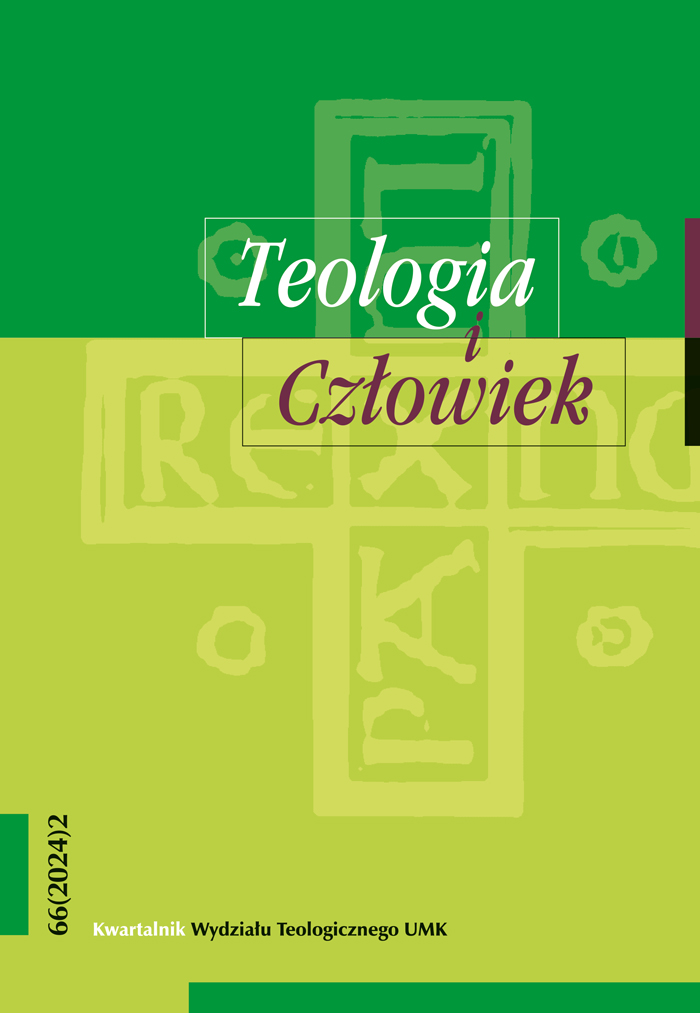Benedict Hesse of Cracow’s Question about Dispensation from Religious Vows from His Commentary on Matthew’s Gospe: Study and Critical Edition
DOI:
https://doi.org/10.12775/TiCz.2024.008Keywords
Benedict Hesse of Cracow, dispensation, religious vows, University of Cracow, 15th century, Jagiellonian LibraryAbstract
This article deals with Benedict Hesse of Cracow’s question about dispensation from religious vows preserved in MS Kraków, BJ 1369, ff. 26v–28v, which is a part of his Commentary on Matthew’s Gospel preserved in MS Kraków, BJ 1366, pp. 245–250 and in MS Città del Vaticano, BAV, Vat. lat. 14646, ff. 75va–77rb. The question was compiled between the year 1446 and March 7, 1448. Based on Aquinas’s thought, Hesse claims that there is no possibility of dispensing a monk from the three religious vows. The vow of obedience can be changed according to circumstances, but it cannot be dispensed. The solemnly professed chastity must always be kept by monks, even though there is a possibility of dispensing a secular priest from his obligation to keep chastity. Poverty belongs to the essence of religious life, therefore there is no possibility of dispensing from it, and each monk, even the abbot, is obliged to keep this vow.
References
Manuscripts
Kraków, Biblioteka Jagiellońska
, 1366, 1368, 1369
Città del Vaticano, Biblioteca Apostolica Vaticana
Vat.lat.14646
Medieval texts
Benedictus Hesse de Cracovia. “Tractatus brevior.” In Polskie traktaty koncyliarystyczne z połowy XV wieku, edited by Wacław Bucichowski, 29–42. Warszawa: Akademia Teologii Katolickiej, 1987. (Textus et studia historiam theologiae in Polonia excultae spectantia, 23).
Studies
Baran, Wojciech. “Benedict Hesse of Cracow’s Question about the Resurrection from the Commentary to Matthew’s Gospel”. Study and Critical Edition, forthcoming.
Baran, Wojciech. “Les Principia aux Sentences de Benoît Hesse de Cracovie (1428–1430).” Etude et édition critique, forthcoming.
Baran, Wojciech. The lectio ultima on Peter Lombard’s Sentences of Benedict Hesse of Cracow (1389–1456). An example of the relationship between the principia and the lectio ultima. Case study and critical edition, forthcoming.
Brînzei Calma M., La définition du viator dans les commentaires des Sentences au XIVe siècle, in: Les innovations du vocabulaire latin à la fin du Moyen Âge : autour du Glossaire du latin philosophique (philosophie, théologie, science), edited by Olga Weijers, Iacopo Costa, and Adriano Oliva, 45–59. Turnhout: Brepols, 2010.
Bucichowski, Wacław, ed. Polskie traktaty koncyliarystyczne z połowy XV wieku. Warszawa: Akademia Teologii Katolickiej, 1987 (Textus et studia historiam theologiae in Polonia excultae spectantia, 23).
Bukała Marcin, Benedictus Hesse de Cracovia. De contractibus censuum reempcionum. Wstęp / Editoris Nota. Warszawa: …………?, 2015.
Catalogus codicum manuscriptorum medii aevi Latinorum, qui in Bibliotheca Jagellonica Cracoviae asservantur, edited by Maria Kowalczyk, Anna Kozłowska, Mieczysław Markowski, and others, vol. 9. Cracoviae: Bibliotheca Jagellonica, Księgarnia Akademicka, 2008.
Chmielowska, Bożena. „Traktat Mateusza z Krakowa jako źródło w komentarzu Benedykta Hessego do Ewangelii św. Mateusza.” Przegląd Tomistyczny 14 (2008): 169–185.
Fijałek, Jan. Studia do dziejów Uniwersytetu Krakowskiego i jego Wydziału Teologicznego w XV wieku. Kraków: Akademia Umiejętności, 1898.
Rechowicz, Marian. Święty Jan Kanty i Benedykt Hesse w świetle krakowskiej kompilacji teologicznej z XV w. Lublin: Towarzystwo Naukowe Katolickiego Uniwersytetu Lubelskiego, 1958.
Markowski Mieczysław. Dzieje Wydziału Teologii Uniwersytetu Krakowskiego w latach 1397–1525. Kraków: Wydawnictwo Naukowe Papieskiej Akademii Teologicznej, 1996.
Ozorowski, Mieczysław. „Życie i działalność Benedykta Hessego.” Studia Teologiczne 16 (1998): 79–92.
Poirel, Dominique. Stemma codicum. La « méthode Froger » d’édition critique. Turnhout: Brepols, 2022 (Brepols Essays in European Culture 6).
Slotemaker J. T., “Henry of Gorkum’s Conclusiones Super IV Libros Sententiarum: Studying the Lombard in the First Decades of the Fifteenth Century.” In Mediaeval Commentaries on the Sentences of Peter Lombard, edited by Philipp W. Rosemann, vol. 3, 145–173. Leiden: Brills, 2015.
Wielgus, Stanisław. “Benedykt Hesse.” In Encyklopedia filozofii polskiej, edited by Andrzej Maryniarczyk and others, vol. 1, 94–96. Lublin: Polskie Towarzystwo Tomasza z Akwinu, 2002, http://www.ptta.pl/pef/pdf/b/benedykth.pdf (last accessed 02.04.2024), English version: http://www.ptta.pl/pef/haslaen/b/benedykthesse.pdf (last accessed 02.04.2024).
Wisłocki, Władysław. Katalog rękopisów Biblijoteki Uniwersytetu Jagiellońskiego, 2 vol. Kraków: Akademia Umiejętności, Drukarnia Uniwersytetu Jagiellońskiego, 1877–1881, vol. 1: https://jbc.bj.uj.edu.pl/dlibra/publication/297832/edition/285039/content (last accessed 02.04.2024); vol. 2: https://jbc.bj.uj.edu.pl/dlibra/publication/297833/edition/285040/content (last accessed 02.04.2024).
Wojtczak, Hanna. „Benedykt Hesse – przedstawiciel naukowego środowiska krakowskiego w pierwszej połowie XV wieku.” Folia Philosophica 30 (2012): 69–88.
Wojtczak, Hanna. Benedykta Hessego Komentarz do Kategorii Arystotelesa, część 1. Lublin: Towarzystwo Naukowe KUL, 2019.
Wojtczak, Hanna. „Komentarze Benedykta Hessego do Ars Vetus w świetle nowych ustaleń.” Przegląd Tomistyczny 24 (2018): 595–609.
Downloads
Published
How to Cite
Issue
Section
License
Copyright (c) 2024 Wojciech Dariusz Baran

This work is licensed under a Creative Commons Attribution-NoDerivatives 4.0 International License.
CC BY ND 4.0. The Creator/Contributor is the Licensor, who grants the Licensee a non-exclusive license to use the Work on the fields indicated in the License Agreement.
- The Licensor grants the Licensee a non-exclusive license to use the Work/related rights item specified in § 1 within the following fields: a) recording of Work/related rights item; b) reproduction (multiplication) of Work/related rights item in print and digital technology (e-book, audiobook); c) placing the copies of the multiplied Work/related rights item on the market; d) entering the Work/related rights item to computer memory; e) distribution of the work in electronic version in the open access form on the basis of Creative Commons license (CC BY-ND 3.0) via the digital platform of the Nicolaus Copernicus University Press and file repository of the Nicolaus Copernicus University.
- Usage of the recorded Work by the Licensee within the above fields is not restricted by time, numbers or territory.
- The Licensor grants the license for the Work/related rights item to the Licensee free of charge and for an unspecified period of time.
FULL TEXT License Agreement
Stats
Number of views and downloads: 280
Number of citations: 0



